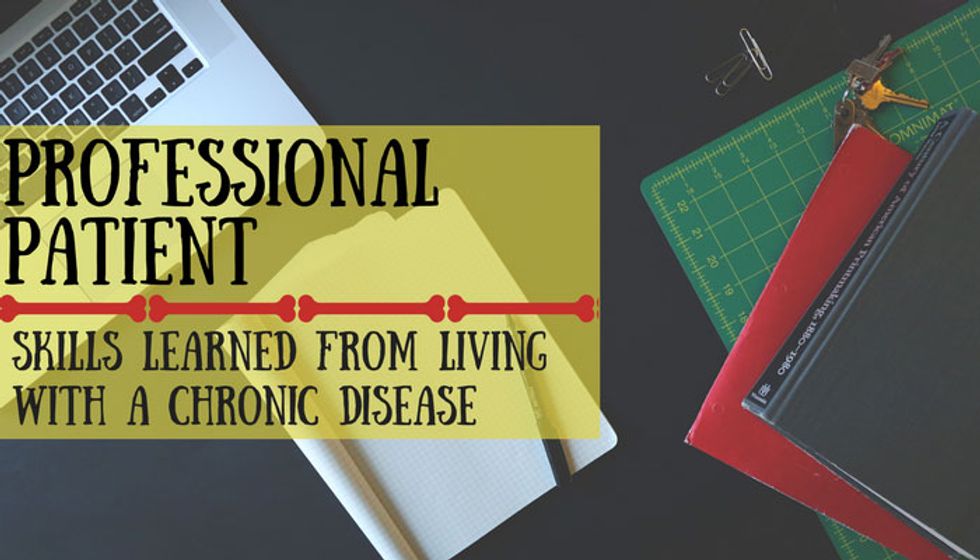Katie Golden is a #teamHealthyWomen Contributor and this post is part of HealthyWomen's Real Women, Real Stories series.
My business card says "Professional Patient." I get so many questions about this. What does that mean exactly? To me, I have acquired skills and knowledge that "healthy people" don't have. Having chronic migraine and pain has exposed me to situations that many others never have to face.
When your health turns suddenly, a lot comes at you quickly. Questions you never thought about before. What are my treatment options? What if I can't work? Which insurance plan is the best for me now? Where can I find support? How do I fill out this mound of paperwork, go to doctors' appointments, keep my job and run my household at the same time?
I've been there. I'm still there. I should get some credit for the battle scars I have earned since becoming chronic, and the term professional patient just seemed appropriate. I had to not only go through the grieving process of a dramatic change in my life, but I was hit with having to navigate a complex medical system.
As a professional patient, I have learned the following lessons. By no means do I excel at all of these! Just thought I'd share observations I've had over the years:
- Understand if your employer offers short-term or long-term disability benefits. If not, it is so important to cover yourself. You never know when illness can strike.
- You are your own best advocate.
- Go into an appointment armed with information and questions.
- Research your disease or condition until you feel like an expert.
- If you feel like you know more than your doctor, it's time to find a new doctor. Never be afraid to get a second opinion.
- Find support, whether through online communities, in-person support groups or therapy. You don't have to go through this alone.
- Ask for help when you need it, it's a sign of strength, not weakness.
- Don't ever let anyone tell you it's "all in your head."
- Educate the ones you love about your disease so they can understand how to help you.
- Plan ahead as much as you can so that if you are too ill you have back-up plans. This is easier said than done and something I need to work on, but I know it's important!
- Be persistent with doctor's offices, medical billing, and insurance companies. Become a squeaky wheel. It sucks that we have to do this to get answers. However, inaction can create serious financial distress in the long run.
- The approval process for Social Security Disability is a nightmare. Get an attorney or advocacy group to help you through the process. Keep meticulous records and be incredibly detailed in describing your daily struggles. Send them a mountain of evidence that can't be ignored.
- Review your insurance options every year. How much did you spend out of pocket last year? Would switching to a new plan save you money? Are your doctor's covered?
- Exercise in whatever shape or form you can. Chair yoga, gentle stretching, walking. It can help you to heal faster and teach you to listen to your body.
- Lastly, your disease does not need to define you. Find things that still make you happy.
I know how incredibly difficult each and every one of these points are to put into practice. I struggle every day. Sometimes I'm really good about following up on insurance questions, but I put exercise on the back-burner. I still feel bad about missing events, but I try not to let it consume me. I'm never done researching and learning about my disease and I'm open to evaluating new or even experimental treatments.
Having to face these complex issues makes us all professional patients. It's daunting, it's overwhelming plus you're sick. Give yourself some credit for managing each day the best you can. Why are you a professional patient?
This post originally appeared on Golden Graine.







